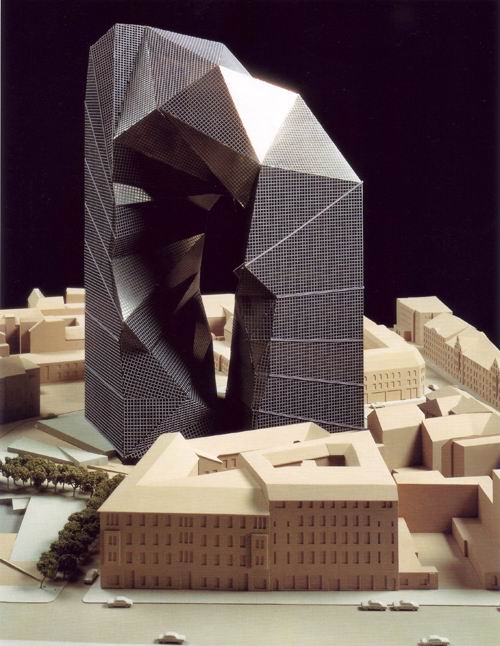 Architecture Words 1: £12.
Architecture Words 1: £12.“I wouldn’t want you to cry for having had to come here tonight for this conversation, because nobody dragged you here.”
Peter Eisenman to Rem Koolhaas.
So ends Supercritical, a little volume that documents the rare meeting of two architect friends/enemies/rivals/(whatever) – Rem Koolhaas & Peter Eisenman. It accurately transcribes the two’s complete inability to say anything meaningful to each other, and their ultimate decline into dressed-up name-calling. This spectacular failure on the part of their dialogue has forced me to split this review into two posts: one on the discussion itself, and one on the novel medium through which this piece presents itself (“its really a magazine in disguise” says Brett Steele).
While I was really disappointed by Eisenman, I don’t want you to think that Koolhaas – who preaches a type of internationally-informed, nationally-dictated, culturally-sensitive, global-metropolitan architecture – is any less narcissistic or arrogant.
Eisenman constantly compares himself to Koolhaas, at times absurdly, almost farcically so: he compares Delirious New York to his own 1963 thesis The Formal Basis of Modern Architecture; S,M,L,XL to his forthcoming Eisenmanual. Then he spins off into reflecting on this discussion as comparable to Corbu meeting Mies. Rem’s response is blunt: there is no comparison to be made, the terms are not exchangeable.
Further, Koolhaas is not interested in discussions of semiotics or form, and does not engage in the tallying up of personal achievements. Eisenman compares his Max Reinhardt Haus to the CCTV on formal grounds, and Rem interjects: “For us [OMA] the diagram is no longer only a device that triggers architecture [that is, it is no longer simply intellectual]. It is also a device with which to look at the world and to try to represent some of the bizarre conditions we observe.”
Koolhaas defends CCTV not formally, but programmatically. The importance of the building, he says, is not its iconic form, but its role as informing a new era of Chinese media communications. “We’re interested in people… not in an intellectual, humanist or architectural sense… but simply how they exist in flows and behaviours of global culture today.”
The contradictions run thick and fast: “Peter is arguing for an optical, thinking individual–” “no, I am against opticality.”… “Peter you just said you see yourself withdrawing from things like magazines and journals to focus on buildings?” “No, no, no. Let me make sure that we get this straight…”
The discussion ends with Eisenman saying he conceives of every building as a one-off, unlike Richard Meier, who has a signature, reproducible and intellectually vacuous style. “We’re dummies, you and I” says Rem, and asks Peter not to intellectually belittle Meier. He reminds him that they met for the first time at one of Meier’s lectures, and that Peter’s dismissal of Meier makes him want to cry… “every time Meier gave a lecture at that time he came to Peter’s office beforehand so that Peter could basically prepare the lecture and write the script for him. And the reason Peter was angry with me was that I was attacking the script, not the dumbness of Meier.”



No comments:
Post a Comment